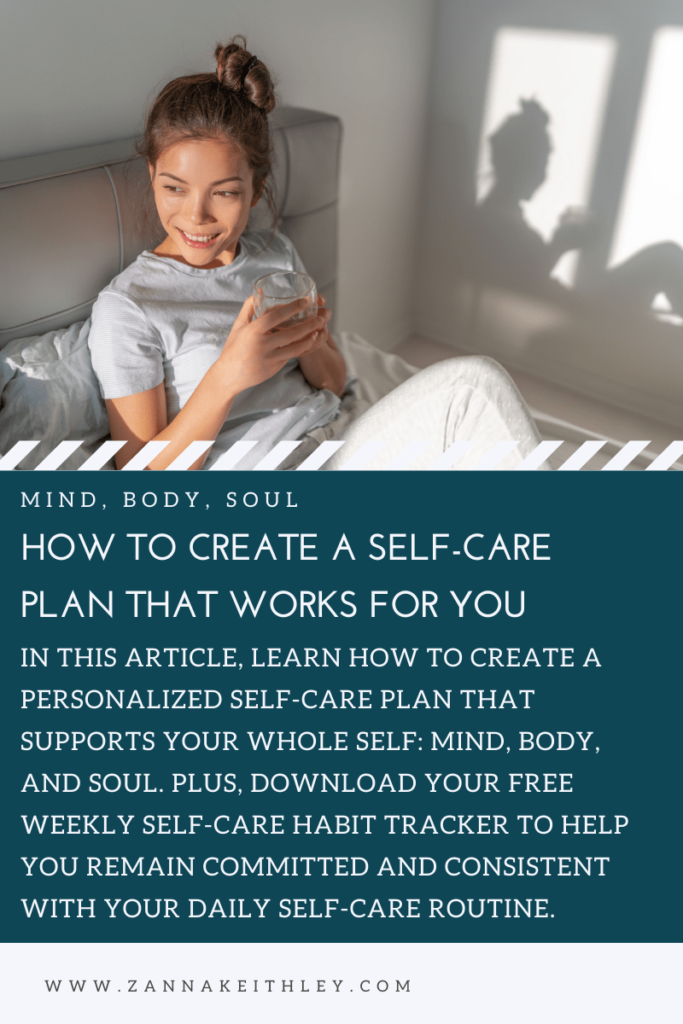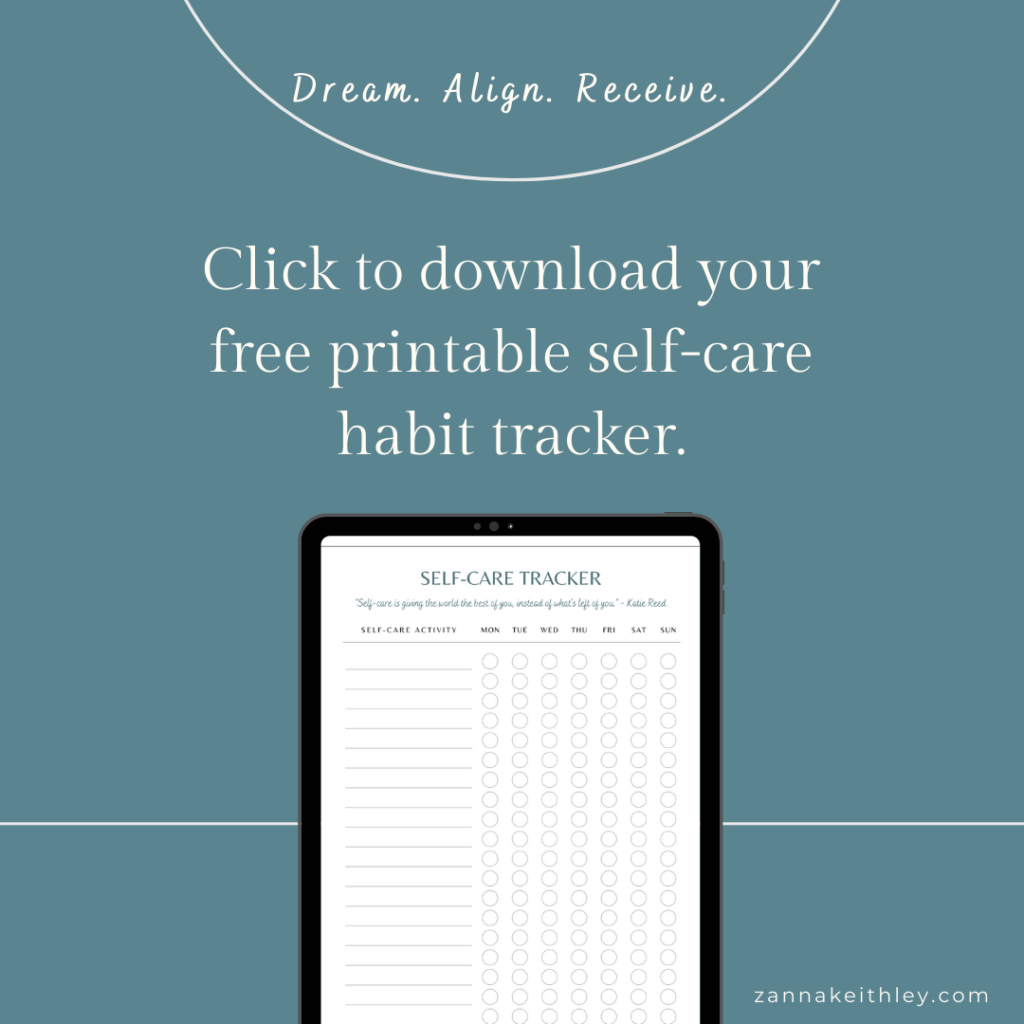-
Self-Care Plan + Free Printable Self-Care Habit Tracker
Below, learn how to create a personalized self-care plan that supports your whole self: mind, body, and soul. Plus, download your free weekly self-care habit tracker to help you remain committed and consistent with your daily self-care routine.

Pin this for later! How To Create A Self-Care Plan That Works For You What Is A Self-Care Plan?
Self-care refers to the combination of practices you engage in to serve and support your physical, spiritual, mental, and emotional well-being. These practices range from the small things you do each day (like brushing your teeth) to the bigger practices that nourish your mind, body, and spirit (like unplugging from social media during the weekend to focus on your innermost self).
When you ask someone whether they practice self-care, you’ll often hear the response that they don’t have time for self-care. You may have even said this yourself a time or two.
This is because we often associate self-care with spa days, pedicures, and those really “big” things that we consider to be luxuries.
But self-care is intrinsically so much more.
You practice self-care when you focus on taking deep, mindful breaths at a traffic light instead of stressing about how many seconds it’ll take for the light to turn green.
You practice self-care when you set boundaries to protect your energy.
You practice self-care when you meditate for ten minutes in the morning before starting your workday.
Self-care can be practiced in many ways, big and small. And a self-care plan personalized to your specific needs can help you prioritize your self-care not just as an “every once in a while” practice but as something you do every single day.
But first-—what exactly is a self-care plan?
A self-care plan is a set of practices you prioritize in your daily life to take care of your mental, physical, emotional, and spiritual health. This is kind of like preventative care for your mind, body, and soul. Instead of waiting until your cup is completely empty before you finally let yourself focus on your own needs, you can keep your cup full each day by engaging in activities that nourish your spirit.
Below, you’ll learn how to create a self-care plan that works for you in seven simple steps. Plus, be sure to download your free self-care habit tracker to help you stay committed and consistent in your daily self-care routine. (Click here to skip straight to your freebie!)
- You May Also Like: 30-Day Self-Care Challenge (Free Printable)

How To Create A Self-Care Plan That Works For You
Step 1: Define What Self-Care Means To You
The first step in building a self-care plan is to define what self-care means to you. By creating your own definition of self-care, you can focus on incorporating practices into your daily routine that fit this definition.
We’re all different, so we likely won’t all have the exact same definition of self-care. For instance, maybe you want to focus more on the spiritual side of self-care, or maybe the spiritual aspect is less important, but mental self-care is your priority.
To help you get started, here are a few definitions of self-care from individuals and health organizations that you can use as a foundation:
- The World Health Organization defines self-care as “the ability of individuals, families and communities to promote health, prevent disease, maintain health, and to cope with illness and disability with or without the support of a healthcare provider.”
- The Global Self-Care Federation defines self-care as “the practice of individuals looking after their own health using the knowledge and information available to them. It is a decision-making process that empowers individuals to look after their own health efficiently and conveniently, in collaboration with health and social care professionals as needed.”
- And I love this quote by writer Katie Reed: “Self-care is giving the world the best of you, instead of what’s left of you.”
- And another one I love by author Robyn Conley Downs: “Self-care: doing the things that make you feel more like yourself.”
Craft a definition that feels authentic to you, and let this be your guiding light as you create a self-care plan personalized to your needs.
Step 2: Identify Your Objective
After you’ve defined self-care for yourself, take some time to identify your purpose and objective for creating this plan.
For instance, is there a specific problem in your life that you’re trying to solve? Do you find yourself tired and burned out by the end of the week due to never-ending tasks, chores, and to-do lists? Are you looking to support your own health and well-being for long-term, sustainable happiness?
Identifying your objective will help you as you begin brainstorming new self-care practices you want to include in your daily routine.
If your objective is to create a mindset of peace and calm so you won’t become overwhelmed by external demands, then you’ll know to include practices to support a calm mindset (like meditation, yoga, and breathing exercises).
If your objective is to take care of your long-term health and well-being (kind of like preventative care for your whole self), then you know you’ll want to include self-care practices that accomplish this goal.
Finally, identifying your objective will help you to stay on-track for those self-care activities you might not always want to do. While the majority of your self-care plan should feel really good to you (i.e. you should want to do these things because they genuinely make you happy), there may be a few things you’re not super excited about. Exercising is a big one for a lot of people.
There may also be times when you want to practice self-care, but your mind tells you that you should be working late at night or doing something more “productive.”
In these moments, remembering your objective—or your why—can help you realign with this important truth:
Self-care isn’t a luxury. It’s a necessity for the long-term health of your mental, emotional, physical, and spiritual well-being.
Step 3: Acknowledge The Self-Care Practices You Already Regularly Do
Self-care isn’t just about the really big things that take dedicated time and effort to complete. It’s also about the little things you do in your daily life to take care of your entire well-being: mind, body, and soul.
Showering, brushing your teeth, and washing your face are all examples of self-care you likely already practice in your daily life. Scheduling doctor’s appointments is another example of self-care. So is making healthy food choices and getting enough sleep at night.
You’re likely already practicing self-care in both small and big ways. If you meditate regularly, go to yoga class a couple times a week, or take a daily walk outside, you’re already dedicating time to self-care. It may not always feel like this because we often associate self-care with spa days and bubble baths, but self-care comes in all forms.
(And some of the most important daily self-care practices you can do that don’t take any extra time or energy on your part? Speaking to yourself with kindness and compassion when no one is around. Being kind to yourself in the privacy of your own mind. Building yourself up rather than tearing yourself down.)
Write down all the things you’re already doing to nourish your mind, body, and soul. You’re not building your self-care plan from nothing. These self-care practices you already do will be the foundation for your well-rounded, personalized routine.
Step 4: Write Down Any Negative Coping Mechanisms You May Have
This one may be a little harder, but it’s important to be honest with yourself. When you’re feeling stressed or overwhelmed, do you have any negative coping mechanisms that might feel good in the moment but don’t contribute to your overall health and well-being?
Negative coping mechanisms could include drinking, eating junk food, impulsive spending, consuming social media and gossip websites, and excessively withdrawing from others.
Write down any negative coping mechanisms you have that you’d like to release. A self-care plan isn’t just about what you add into your life but also what you’re letting go of. When you let go of what no longer serves you, you make space in your life for more of the things that do.
As you begin thinking about what new self-care practices you want to incorporate into your life, consider the negative coping mechanisms you’ve leaned on in the past. Self-care means acknowledging these coping mechanisms (without judgment or criticism—remember, you’re only human) and understanding the root of why you lean on these things to cope with difficult situations.
Sometimes, these negative coping mechanisms may be easy to let go of and replace. Maybe you tend to go straight to the junk food when you’re feeling stressed at work, and you can instead turn your attention to breathing exercises, meditation, nature walks, positive affirmations, and other tools to serve and support you.
But in other scenarios, these negative coping mechanisms may be a little more difficult to let go of. It may also go beyond the coping mechanism itself—maybe it’s the root of the issue that really needs to be addressed.
If this is the case, remember that talking to someone—whether that’s a therapist, counselor, or someone else who can help you—is also an important aspect of self-care.
Step 5: Write Down The Self-Care Practices You Want To Add To Your Daily Routine
Now, the fun part. What self-care practices do you want to add to your daily routine?
To do this, it might be helpful to break it down into categories: Mental Self-Care, Physical Self-Care, Emotional Self-Care, and Spiritual Self-Care. You can also include a category for Professional Self-Care, which would include self-care practices that can support you while you’re at work.
When you’re making your plan, try not to make it too overwhelming—and just as importantly, make it something that actually feels exciting for you. Don’t throw in things just because you think you should do them. Fill it with activities that feel good and right for you.
Some people may love to cook and find a lot of joy in the cooking process, but if this isn’t you, don’t force it. In fact, your personal self-care plan might include ideas to decrease your time spent cooking throughout the week.
Here are some ideas for different types of self-care practices you can include in your plan:
Mental Self-Care
- Practice mindfulness
- Learn a new skill
- Read a book rooted in personal growth
- Unplug from social media
- Do something creative
- Talk to a counselor or therapist
Emotional Self-Care
- Journal
- Create a gratitude list
- Spend time in the sun
- Have a coffee date with a friend who always lifts your spirits
- Take a relaxing bath with candles
- Hug someone you love
- Watch your favorite funny TV show
- Laugh, cry, or do a little of both
Physical Self-Care
- Stretch your body
- Go on a daily walk around the neighborhood
- Drink plenty of water
- Get enough sleep to feel rested and energized
- Move your body in a way that feels good to you
- Practice good hygiene
Spiritual Self-Care
- Pray
- Spend time in solitude
- Create a sacred space in your home
- Connect with your higher self
- Meditate
- Journal under the new moon (or full moon)
- Read a book rooted in spirituality
- Connect with a spiritual community
And don’t forget to add in professional self-care if this is important for you. Examples of professional self-care practices include eating lunch away from your desk, taking regular breaks, using your standing desk (if you have one), setting boundaries, and using your vacation time (either for an actual vacation or for your own mental health day).
Step 6: Schedule Your Self-Care Into Your Calendar
After you write down what practices you want to include in your self-care plan, it’s time to commit to them. And the best way to do this is to schedule your self-care as a non-negotiable promise to yourself in your calendar.
To start, pick out any “bigger” self-care practices that are going to take a little more time. For instance, maybe you want to start taking yourself out on a date once a week. Now go ahead and schedule these events into your calendar.
If there’s anything additional you’ll need before you start (such as facial masks for your own at-home spa night or a good book for the reading time you have scheduled later in the week), make sure you write down and commit to purchasing these products, too.
Then, take a look at the smaller daily activities you want to focus on. This could include practices such as meditating for ten minutes every morning, going on a daily walk, spending time in the sun, or stretching in the evenings.
Instead of scheduling each of these things into your calendar every day (though you absolutely can if you find it helpful), you might find it beneficial to create a habit tracker for your self-care practices.
A habit tracker is a tool that helps you track how well you’re sticking to the daily habits you’ve decided to commit to.
After you complete a self-care practice, mark it on your habit tracker to signify that you completed it. At the end of each week or month, you’ll be able to easily see which habits you were consistent with and which ones you might need to focus on a little more.
Note that the purpose of the habit tracker isn’t to judge or criticize yourself for what you do or don’t do. It’s simply an assessment tool that can also help keep you committed and consistent in prioritizing your self-care. (Remember: Consistency > Perfection)
To help you get started, you can skip to the bottom of this post to download your free self-care habit tracker.
Step 7: Reflect & Adjust Your Plan After The First Month
Are there any self-care practices you included in your plan that you’re realizing you don’t actually enjoy? Is there something that can be tweaked or changed? Or do you want to add more of something into your plan? (For instance, increasing your daily meditation time by ten minutes or adding an extra hour of reading and relaxation time into your week.)
Make sure you’re regularly assessing your self-care plan for what is and isn’t working. Just because you committed to something in the beginning doesn’t mean you have to continue doing it if it doesn’t feel right.
Remember, your self-care plan is meant to serve you, not the other way around. Don’t do something just because you feel like you’re supposed to. Do it because it supports your mind, body, and soul—because it makes you feel better in the long-term, not worse.
Are you ready for your free printable self-care tracker? Click here to download yours today! This digital file is completely free for your personal use. I just ask that if you do share this file on your website or social media, you link back to this website or tag me. I’d love to see how you fill out your personal self-care plan!
For more resources on spirituality, meditation, manifestation, and all things self-love, connect with me on Instagram and Pinterest, where I’m posting positive affirmations and empowering messages daily.
More Articles You May Like
- Sacred Self-Care For The 7 Chakras (A Complete Guide)
- Vision Board Ideas To Visualize Your Ideal Future (With Examples)
- 8 Powerful Guided Meditations For Manifesting Your Dreams
- 30 Journal Prompts For Self Growth (& Deeper Self-Love)
- 11 Beautiful Poetry Books About Self-Love & Acceptance

Pin this for later! How To Create A Self-Care Plan That Works For You 
Zanna Keithley is an author, poet, and social media content creator who writes short prose dedicated to inspiring readers to follow their dreams, trust their intuition, and create beautiful and fulfilling lives. You can find her original writing on Instagram @zannakeithley.







